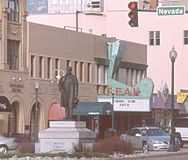Winfield Scott Stratton
| Winfield Scott Stratton | |
|---|---|
 Winfield Scott Stratton, 1901 | |
| Born |
July 22, 1848 Jeffersonville, Indiana |
| Died |
September 14, 1902 (aged 54) Colorado Springs, Colorado |
Winfield Scott Stratton (July 22, 1848 – September 14, 1902) American prospector, capitalist, and philanthropist. He discovered the Independence Lode near Victor, Colorado on July 4, 1891, and became the Cripple Creek district's first millionaire in 1894.
Biography
Born in Jeffersonville, Indiana, Stratton arrived in the Colorado Springs, Colorado area in 1868 and worked as a carpenter. He descends from the Windsor, [Conn.] line of the Stratton family.[1] His marriage to Zura V. [Stewart], in June 1876, ended shortly after the wedding when Stratton declared that he was not responsible for his wife's pregnancy, and sent her back to her parents. He set out following the gold and silver rushes in Colorado, but without success. On hearing word of gold on the south slope of Pike's Peak he made his big strike on July 4, 1891, near the present town of Victor, Colorado, in the Cripple Creek mining district.
Stratton had a hard time getting started developing Independence mine, but once going, it was like an underground bank. Not only was Stratton rich, he was generous. After the Cripple Creek fire of 1896, Stratton paid for food and shelter for the thousands left homeless by the fire. He wrote a check for $5,000 to “Crazy Bob” Womack, the prospector who first discovered gold at Cripple, but was down on his luck. He gave $15,000 to Horace A. W. Tabor when Tabor was broke. However, he tired of having people pester him for money, and he became reclusive and eccentric. He drank and read a great deal, but almost never had guests or went out socially.
In 1900, Stratton sold the Independence Mine to the Venture Corporation of London for $10 million. The Venture Corporation incorporated the property as Stratton's Independence Ltd. and sold shares on the London stock exchange. The ore reserves were discovered to be less than previously thought in late 1900, and the share price crashed. Venture Corporation later sued the Stratton estate, claiming that the mine had been salted, but lost in the U. S. courts.
Legacy

When Winfield Scott Stratton died on 14 September 1902, he left the bulk of his estate for the establishment of the Myron Stratton Home, for "the aged poor and dependent children;" named for his father Myron Stratton.[2] This bequest was not popular with many. After extended litigation from many, including his son, the Venture Corporation, and thirteen women who claimed to have been secretly married to Stratton, only 6 million was finally available; but the home was established successfully in 1913.
Stratton's other legacies include the Colorado Springs & Interurban Railway, a trolley system connecting Colorado Springs and Manitou Springs; the ground on which the current Colorado Springs City Hall stands; and money to complete the Short Line railroad.
A bronze statue of Stratton by Nellie Walker was placed on the grounds of his estate in 1909. The sculptor of the work ended up living at the Myron Stratton Home for the last years of her life. Another casting of Walker's statue of Stratton stands in downtown Colorado Springs.
Stratton was inducted into the National Mining Hall of Fame.[3]

Places named after Stratton include:
- Stratton Park, Colorado Springs.
- Stratton Hall at Colorado School of Mines, completed in 1904, was named after Stratton, who gave the school its first philanthropic gift of $25,000. He had been appointed as a CSM trustee in 1899 and was elected president of the board in 1901.[4]
- Stratton Spring; a mineral spring drilled to a depth of 283 feet completed February 21, 1936 at the loop where the trolleys turned around at 955 Manitou Avenue in Manitou Springs, Colorado.
- Winfield Scott Stratton Post Office in Colorado Springs; named by an act of Congress in 1995; Stratton had sold the land the post office was built on to the federal government at a fraction of its value with the understanding that it would be used for the post office.
- Stratton Elementary School in Colorado Springs.
- Three connected streets in Colorado Springs, named 'Winfield,'Scott', and 'Stratton'.
References
- ↑ Stratton, Harriet Russell. A Book of Strattons: A Collection of the Records of the Descendents of the Early Colonial Strattons in America from the Fifth Generation to the Present Day. New York: Frederick H. Hitchcock, Genealogical Publishers, 1918. Vol. II, Pp. 321 – 340.
- ↑ Stratton, Harriet Russell. A Book of Strattons: A Collection of the Records of the Descendents of the Early Colonial Strattons in America from the Fifth Generation to the Present Day. New York: Frederick H. Hitchcock, Genealogical Publishers, 1918. Vol. II, Pp. 325 – 326.
- ↑ http://www.mininghalloffame.org/inductee.asp?i=54&b=inductees%2Easp&t=n&p=S&s=
- ↑ "Giving Societies". Colorado School of Mines. Retrieved 2007-02-21.
Further reading
- Waters, Frank (1972) [1937]. Midas of the Rockies (trade paperback) (reprint ed.). Chicago: Sage Books. ISBN 0-8040-0591-5. OCLC 357334.
- Strickler, David P (1964) [1963]. The Fight for the Stratton Millions. Colorado Springs: J.J. Lipsey, Western Books. OCLC 4575871.
- Sprague, Marshall (1994). The King of Cripple Creek: the Life and Times of Winfield Scott Stratton, First Millionaire from the Cripple Creek Gold Strike. Colorado Springs: Friends of the Pikes Peak Library District. ISBN 1-884003-04-4. OCLC 32174323.
- McKenna, Clara Anne (1998). A Golden Legacy: Winfield Scott Stratton and the Myron Stratton Home, 1848-1998. Colorado Springs: Myron Stratton Home. OCLC 40555637.
External links
- Mining Hall of Fame bio
- ColoradoVacation Biography
- Myron Stratton Home Website
- Winfield Scott Stratton at Find a Grave
|